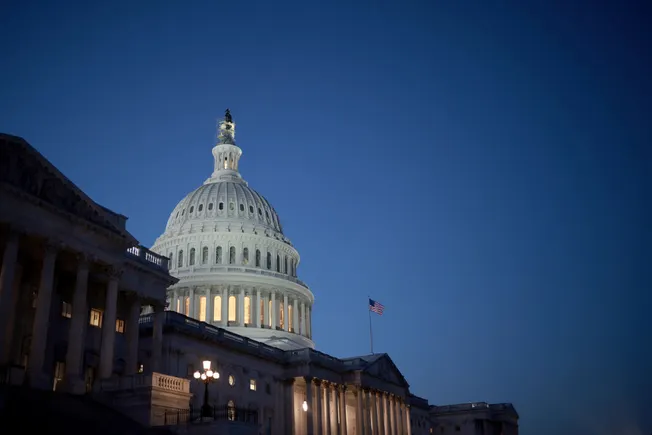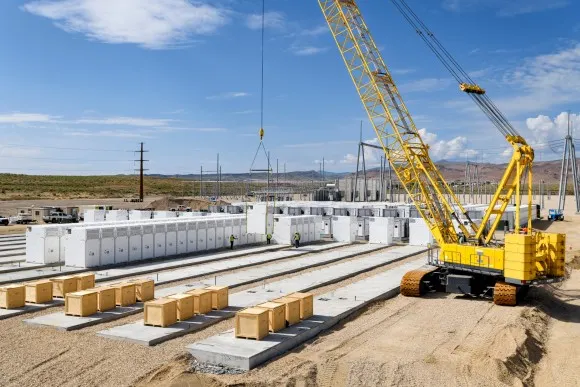
Alberta Premier Danielle Smith played down concerns that the secession movement in her province will scare away investors, saying it’s up to the government of Mark Carney to prove Canada can be a more attractive place for capital.
Polls show a significant minority of Albertans are interested in exploring independence from Canada, partly because they’re frustrated about environmental rules that limit the development of oil and gas. The cancellation of proposed crude oil pipelines including Energy East is the result of federal “anti-investment policies,” Smith said, and she argued Carney must reverse those measures if he wants to tamp down separatism.
“They have to take responsibility for the fact that that sentiment is there,” the Alberta leader said in an interview with Bloomberg News in Calgary. “I’m telling him what the pathway is to have it subside, and I guess it’ll be up to him to choose whether or not he takes that pathway.”
A survey published last month by the Angus Reid Institute said 36% of Albertans would likely vote to leave in a referendum on seceding from Canada. But the polling firm also found many of those people would be open to changing their minds if concessions are made to help the province’s No. 1 industry, such as scrapping the emissions cap and the ban on large oil tankers off much of British Columbia’s coast. Both were policies of former Prime Minister Justin Trudeau.
The tanker prohibition restricts Canada’s ability to ship Alberta oil to Asian markets, and is one reason the vast majority of its crude is sold to US refiners at a discount. Removing it is one of nine demands Smith made after Carney became prime minister.
Smith reiterated that she doesn’t support secession from Canada but her government recently passed legislation that makes it easier for citizens to force referendums. A petition of just 177,000 voters’ signatures would be enough.
That makes it more likely that residents of the energy-rich province of 5 million people will be voting on a separation question in 2026.
“I think the ball is in the prime minister’s court and I’ve told him that,” Smith said. “If we can address these things to change the investment climate” then the separatist threat can be defused, she added.
Smith on Tuesday announced the formation of the Alberta Next Panel, which will gather input from experts, community leaders and citizens on how the province can better protect its interests within Canada. Ideas that will be discussed include the possible formation of an Alberta pension plan and a provincial police service, and whether to push for changes to federal transfer programs, the government said.
That process also will recommend potential referendum questions for Albertans to vote on in 2026, the government said.
Carney, who grew up in Alberta, has sought to address some of Alberta’s concerns by naming Timothy Hodgson, a former Goldman Sachs executive, as his new natural resources minister with a mandate to turn Canada into an “energy superpower.” In his first visit to Calgary after his appointment, Hodgson told executives: “We need infrastructure that gets our energy to tidewater and to trusted allies — diversifying beyond the US.”
Parliament is expected to pass a law this week to allow for speedier review of projects that the government deems to be in the national interest. The legislation, which meets a Carney election campaign promise, creates a new federal office to handle the work of approving those proposals.
Major Canadian companies including Sun Life Financial Inc. moved their head offices out of Quebec after a separatist political party took power in the French-speaking province during the 1970s.
Quebec has had two referendums on sovereignty from Canada, in 1980 and 1995, and both were defeated — the latter by a narrow margin.
The 1995 vote resulted in the Canadian government passing the Clarity Act, a law that makes it more difficult, but not impossible, for a province to secede from Canada. It says the government can’t negotiate the exit of a province from the federation unless voters chose independence by a “clear majority” on a clear referendum question.
WHAT DO YOU THINK?
Generated by readers, the comments included herein do not reflect the views and opinions of Rigzone. All comments are subject to editorial review. Off-topic, inappropriate or insulting comments will be removed.


















